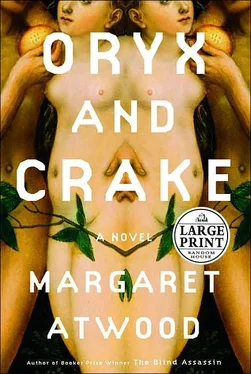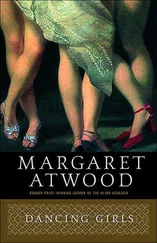Fat chance.
“Oh Snowman, why are you talking to no one?” says a voice. Snowman opens his eyes: three of the older children are standing just out of reach, regarding him with interest. They must have crept up on him in the dusk.
“I’m talking to Crake,” he says.
“But you talk to Crake through your shiny thing! Is it broken?”
Snowman lifts his left arm, holds out his watch. “This is for listening to Crake. Talking to him is different.”
“Why are you talking to him about stars? What are you telling to Crake, oh Snowman?”
What, indeed? thinks Snowman. When dealing with indigenous pe oples, says the book in his head—a more modern book this time, late twentieth century, the voice a confident female’s— you must attempt to respect their traditions and confine your explanations to simple concepts that can be understood within the contexts of their belief systems. Some earnest aid worker in a khaki jungle outfit, with netting under the arms and a hundred pockets. Condescending self-righteous cow, thinks she’s got all the answers. He’d known girls like that at college. If she were here she’d need a whole new take on indigenous .
“I was telling him,” says Snowman, “that you ask too many questions.” He holds his watch to his ear. “And he’s telling me that if you don’t stop doing that, you’ll be toast.”
“Please, oh Snowman, what is toast?”
Another error, Snowman thinks. He should avoid arcane metaphors. “Toast,” he says, “is something very, very bad. It’s so bad I can’t even describe it. Now it’s your bedtime. Go away.”
“What is toast?” says Snowman to himself, once they’ve run off. Toast is when you take a piece of bread—What is bread? Bread is when you take some flour—What is flour? We’ll skip that part, it’s too complicated. Bread is something you can eat, made from a ground-up plant and shaped like a stone. You cook it… Please, why do you cook it? Why don’t you just eat the plant? Never mind that part—Pay attention. You cook it, and then you cut it into slices, and you put a slice into a toaster, which is a metal box that heats up with electricity—What is electricity? Don’t worry about that. While the slice is in the toaster, you get out the butter—butter is a yellow grease, made from the mammary glands of—skip the butter. So, the toaster turns the slice of bread black on both sides with smoke coming out, and then this “toaster” shoots the slice up into the air, and it falls onto the floor…
“Forget it,” says Snowman. “Let’s try again.” Toast was a pointless invention from the Dark Ages. Toast was an implement of torture that caused all those subjected to it to regurgitate in verbal form the sins and crimes of their past lives. Toast was a ritual item devoured by fetishists in the belief that it would enhance their kinetic and sexual powers. Toast cannot be explained by any rational means.
Toast is me.
I am toast.
The sky darkens from ultramarine to indigo. God bless the namers of oil paints and high-class women’s underwear, Snowman thinks. Rose-Petal Pink, Crimson Lake, Sheer Mist, Burnt Umber, Ripe Plum, Indigo, Ultramarine—they’re fantasies in themselves, such words and phrases. It’s comforting to remember that Homo sapiens sapiens was once so ingenious with language, and not only with language. Ingenious in every direction at once.
Monkey brains, had been Crake’s opinion. Monkey paws, monkey curiosity, the desire to take apart, turn inside out, smell, fondle, measure, improve, trash, discard—all hooked up to monkey brains, an advanced model of monkey brains but monkey brains all the same. Crake had no very high opinion of human ingenuity, despite the large amount of it he himself possessed.
There’s a murmuring of voices from the direction of the village, or from what would be a village if it had any houses. Right on schedule, here come the men, carrying their torches, and behind them the women.
Every time the women appear, Snowman is astonished all over again. They’re every known colour from deepest black to whitest white, they’re various heights, but each one of them is admirably proportioned. Each is sound of tooth, smooth of skin. No ripples of fat around their waists, no bulges, no dimpled orange-skin cellulite on their thighs. No body hair, no bushiness. They look like retouched fashion photos, or ads for a high-priced workout program.
Maybe this is the reason that these women arouse in Snowman not even the faintest stirrings of lust. It was the thumbprints of human imperfection that used to move him, the flaws in the design: the lopsided smile, the wart next to the navel, the mole, the bruise. These were the places he’d single out, putting his mouth on them. Was it consolation he’d had in mind, kissing the wound to make it better? There was always an element of melancholy involved in sex. After his indiscriminate adolescence he’d preferred sad women, delicate and breakable, women who’d been messed up and who needed him. He’d liked to comfort them, stroke them gently at first, reassure them. Make them happier, if only for a moment. Himself too, of course; that was the payoff. A grateful woman would go the extra mile.
But these new women are neither lopsided nor sad: they’re placid, like animated statues. They leave him chilled.
The women are carrying his weekly fish, grilled the way he’s taught them and wrapped in leaves. He can smell it, he’s starting to drool. They bring the fish forward, put it on the ground in front of him. It will be a shore fish, a species too paltry and tasteless to have been coveted and sold and exterminated, or else a bottom-feeder pimply with toxins, but Snowman couldn’t care less, he’ll eat anything.
“Here is your fish, oh Snowman,” says one of the men, the one called Abraham. Abraham as in Lincoln: it had amused Crake to name his Crakers after eminent historical figures. It had all seemed innocent enough, at the time.
“This is the one fish chosen for you tonight,” says the woman holding it; the Empress Josephine, or else Madame Curie or Sojourner Truth, she’s in the shade so he can’t tell which. “This is the fish Oryx gives you.”
Oh good, thinks Snowman. Catch of the Day.
Every week, according to the phases of the moon—dark, first quarter, full, second quarter—the women stand in the tidal pools and call the unlucky fish by name—only fish , nothing more specific. Then they point it out, and the men kill it with rocks and sticks. That way the unpleasantness is shared among them and no single person is guilty of shedding the fish’s blood.
If things had gone as Crake wanted, there would be no more such killing—no more human predation—but he’d reckoned without Snowman and his beastly appetites. Snowman can’t live on clover. The people would never eat a fish themselves, but they have to bring him one a week because he’s told them Crake has decreed it. They’ve accepted Snowman’s monstrousness, they’ve known from the beginning he was a separate order of being, so they weren’t surprised by this.
Idiot, he thinks. I should have made it three a day. He unwraps the warm fish from its leaves, trying to keep his hands from trembling. He shouldn’t get too carried away. But he always does.
The people keep their distance and avert their eyes while he crams handfuls of fishiness into his mouth and sucks out the eyes and cheeks, groaning with pleasure. Perhaps it’s like hearing a lion gorge itself, at the zoo, back when there were zoos, back when there were lions—a rending and crunching, a horrible gobbling and gulping—and, like those long-gone zoo visitors, the Crakers can’t help peeking. The spectacle of depravity is of interest even to them, it seems, purified by chlorophyll though they are.
Читать дальше












